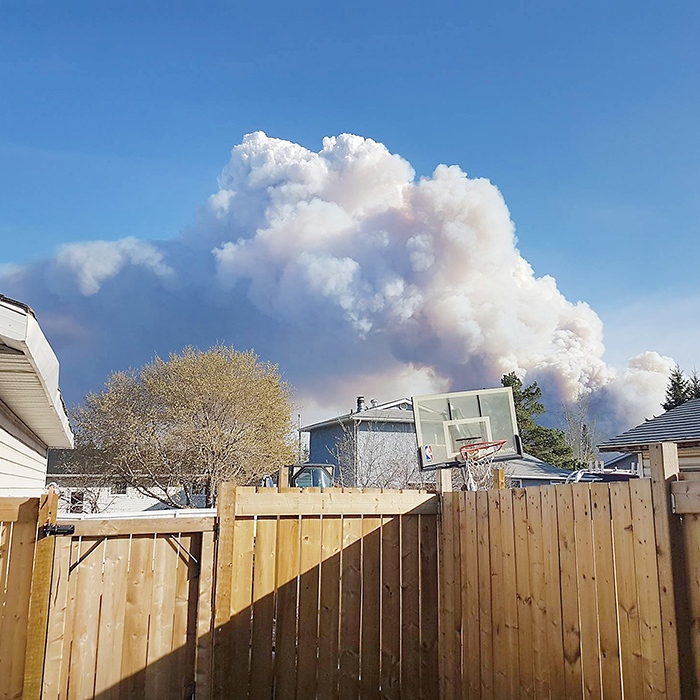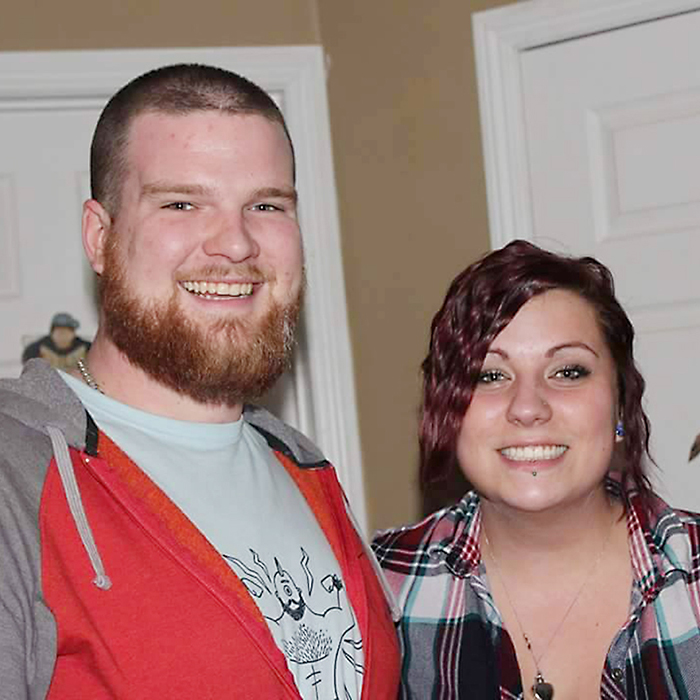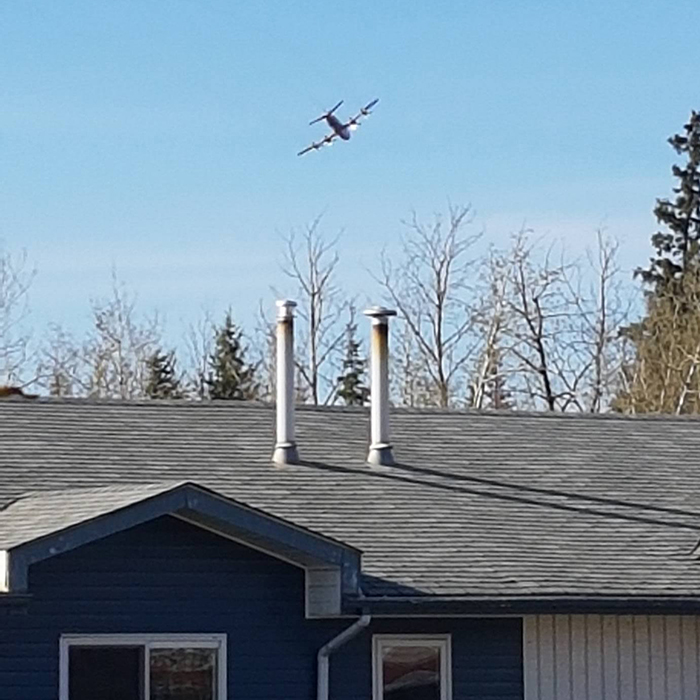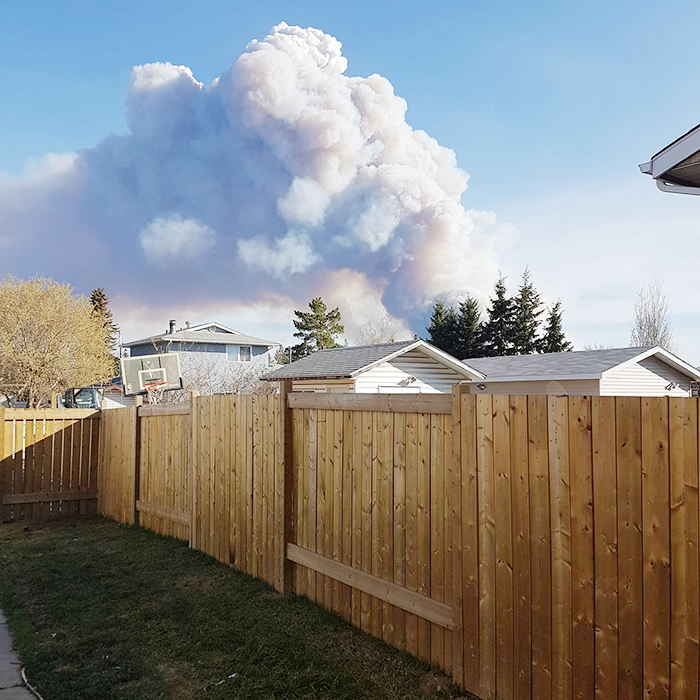
C-K native recalls harrowing escape from massive wildfire
Most Chatham-Kent folks could only sit and watch in wonder via TV and online news reports about the devastation caused by the wildfire raging around Fort McMurray, Alta. this week.
But not Sam Sluys. He lived it, and escaped it, driving through flames “licking up over the highway.”
And he can’t wait to go back.
Sluys, 24, who grew up in Blenheim and Chatham, attending Chatham Christian School, moved to Fort McMurray in 2011, ostensibly for a summer job. But he never left, until Mother Nature pushed him down the highway.
“It was pretty amazing. I’ve definitely never seen anything like it in my life,” he said of the intense rage of the wildfire.
The forest fire broke out near Fort McMurray in northern Alberta sometime Sunday. Sluys said by Monday, the fire grew and was encroaching on some of the city’s districts.

Chatham-Kent native Sam Sluys and his girlfriend Megan Eliuk are among the thousands who had to evacuate Fort McMurray, Alta. earlier this week.
He said a couple of smaller sections of Fort McMurray received voluntary evacuation notifications Sunday – TaigaNova and Abasand Heights.
“As soon as I heard of a voluntary evacuation, that’s when Megan and I topped up our vehicles,” he said of he and his girlfriend, Megan Eliuk. “That was an absolute lifesaver.”
Monday, the fire got bigger, covering about 18 square kilometres, and closer.
“On Monday, there was a small grassfire down my street. Local folks put it out with garden hoses and a fire extinguisher,” Sluys said.

A water bomber flies overhead Monday in Fort McMurray, Alta.
A day later, all hell broke loose, as the fire had crossed the Athabasca River and now approached Fort McMurray from the south and the west.
“Tuesday morning we woke up to hear the fire had jumped the river. At 10 a.m., the winds shifted and it really started to pick up in size and speed on its way towards the city,” he said of the blaze. “We went on a walk to see where it had crossed the river. That hillside we walked on that morning has all been wiped out.”
By early afternoon, Sluys and Eliuk knew it was time to go and they packed some bags. While Eliuk left to help a family member, Sluys continued getting ready – until he received a text from his girlfriend.
“She saw on Facebook a photo of the fire coming down to Highway 63, and she texted me, telling me to go.”
Their home is on Thickwood Boulevard, near Hwy. 63.
Leaving town was a very harrowing experience, Sluys said.
“Traffic really got congested where the fire was encroaching. Megan was about 1.5 km behind me. The drive up Beacon Hill was probably the most intense. I was on the phone with Megan. There were trees burning 50 feet away and the grass was on fire right up to the road. Visibility was very low. You could only see a few cars in front of you.
“The fire was coming and licking up over the highway. It was, ‘just don’t stop,’ and ‘hope for the best’ there. That drive up Beacon Hill was the spookiest. It is something I’ll never forget.”
But the two escaped the inferno, as did everyone else in Fort McMurray.
While they got out, the “emotional rollercoaster” wasn’t over. The two had to negotiate horrendous traffic down Hwy. 63, the only road into and out of Fort McMurray, until a junction with Hwy. 881 to the south.
The two opted to take Hwy. 881, as the traffic seemed less congested. Thanks to their full fuel tanks, they left behind huge lineups of people trying to get fuel in small communities along the route.
“We just needed to put some kilometres between us and the rest of the evacuees. It was mayhem. People were driving very erratically. They were on their phones; there was a lot of panic,” Sluys said.
Now that he and thousands of others are safe and clear of their city, they have time to focus on the sheer quantity of unknowns. When will the fire subside? Is there a home to which they can return? How much rebuilding will be needed?
“As of right now, from what I’ve been hearing, my house is still standing. But with the winds and the weather, who knows,” Sluys said.
“I don’t know if I’m going to have a home to go back to. Everyone’s job is up in the air. No one knows what do to.
“It’s so up in the air at this point. I feel like we need another three or four days to tell whether the fire continues into the city or if it spreads outward.
“If we lose the hospital, grocery stores, and banks, they’re going to have to set it up as a fly in/fly out settlement until we can rebuild. But if they can hold onto the downtown core, the rebuild would be so much easier.”
Meanwhile, support from around the country is heading their way. Sluys said the people of Fort McMurray appreciate the aid.
“So many people are offering up free things. It’s pretty amazing how much Alberta and all of Canada has come together,” he said of the support, much of which is coming in through the Red Cross.
He noticed during the evacuation south that some people weren’t so giving, mentioning that a store in Grassland, Alta. had marked up everything by 30 per cent.
“It’s sad to hear things happen like that in a time like this.”
For now, Sluys and others are living out of a backpack. But he hopes that will change.
“As long as there’s a place to live and food to eat, I’ll be back up there as soon as possible.”








Glad you and Meagan are safe Sam. Wishing you courage and strength as you re-build God Bless
So very glad you are all safe.
I don't know if you have a place to stay but I went to your school and with Sluys back in the 80's I have room in blackfalds if you need a place
Glad Samuel is safe Debbie!!!